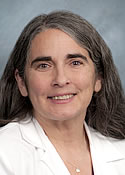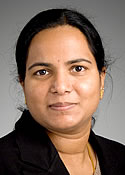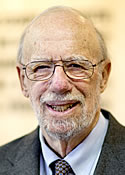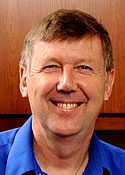Program
Friday • Saturday • Sunday • Monday • Tuesday • Back to Full Program
Chinese Society of Immunology (ChSI) Symposium
Differentiation and Regulation of Lymphocytes
Saturday, May 9, 8:00 AM – 10:00 AM, Room R09
Zhigang Tian, University of Science and Technology of China
Olivera J. Finn, University of Pittsburgh School of Medicine
Zhigang Tian, University of Science and Technology of China, Development and differentiation of liver-resident NK cells
Bing Sun, Institute Pasteur of Shanghai, Chinese Academy of Sciences, Extracellular Matrix Protein 1 plays a critical role in driving Th2 cell migration and controlling Th17 cell differentiation
Liwei Lu, University of Hong Kong, Regulatory B cells in autoimmunity
Hai Qi, Tsinghua University, Follicular T helper cells and germinal center reaction
Zhongjun Dong, Tsinghua University, Metabolic regulation of NK cell development and activation
NIH Grant Seminar Workshop: Demystifying the Application and Review Process
Saturday, May 9, 8:00 AM – 10:00 AM, Room 208-209
Chairs:Tina McIntyre, Scientific Review Officer, Innate Immunity and Inflammation Study Section, Immunology Integrated Review Group, Center for Scientific Review, NIH
Alison Deckhut-Augustine, Chief, Basic Immunology Branch, Division of Allergy, Immunology, and Transplantation, NIAID, NIH
Deborah Hodge, Scientific Review Officer, Immunology Fellowships and AREA Study Section, Immunology Integrated Review Group, DPPS, Center for Scientific Review
Jin Huang, Scientific Review Officer, Tumor Tolerance and Transplantation Study Section, Immunology Integrated Review Group, DPPS, Center for Scientific Review
Nancy Vazquez-Maldonado, Scientific Review Officer, Immunology Review Branch, NIAID, NIH
Lakshmi Ramachandra, Scientific Review Officer, Immunology Review Branch, NIAID, NIH
This workshop will provide participants with an overview of NIH grant application, review, and management. Emphasis will be given to identification of the most appropriate funding agency, how to make an application "reviewer friendly", and other strategies that contribute to applications that succeed in obtaining research funding. The workshop will also provide information on how to understand the peer review system, which is essential to competing successfully for funding, with a focus on recent changes to the review process. NIH review, grants management, and program staff will provide a broad array of expertise and encourage questions from seminar participants. This workshop is open to anyone but is especially intended for new faculty members, young investigators, and advanced postdoctoral fellows.
Major Symposium A: Realizing the Potential of Cancer Immunotherapy
Saturday, May 9, 8:00 AM – 11:30 AM, Great Hall A
Chairs:Jedd D. Wolchok, Memorial Sloan Kettering Cancer Center
Padmanee Sharma, University of Texas MD Anderson Cancer Center
Jedd D. Wolchok, Memorial Sloan Kettering Cancer Center, Combined checkpoint blockade
Padmanee Sharma, University of Texas MD Anderson Cancer Center, Immune checkpoint therapies: clinical success and next steps
Holbrook Kohrt, Stanford Cancer Institute, Combination monoclonal antibody therapy: dual tumor and immune targeting
Steven A. Rosenberg, NCI, NIH, The curative potential of T cell transfer immunotherapy for human cancer
Pramod K. Srivastava, University of Connecticut School of Medicine, What does a host-protective tumor-specific neo-antigen look like?
Suzanne L. Topalian, Johns Hopkins University School of Medicine, PD-1 pathway blockade in cancer therapy: new frontiers
Major Symposium B: The Microbiota in Immunity and Inflammation
Saturday, May 9, 8:00 AM – 11:30 AM, Great Hall B
Chairs:Wendy S. Garrett, Harvard School of Public Health
Yasmine Belkaid, NIAID, NIH
Yasmine Belkaid, NIAID, NIH, From mutualism to parasitism: context and consequences
Wendy S. Garrett, Harvard School of Public Health, The gut microbiome in colitis and colorectal cancer
Eric G. Pamer, Memorial Sloan Kettering Cancer Center, Microbiota-mediated defense against intestinal infections
Ami S. Bhatt, Stanford University, Exploring the composition of the human superorganism: the microbiome in an immunocompromised host
Bana Jabri, University of Chicago, Harnessing the interplay between commensals and pathogens in septic shock
Thaddeus S. Stappenbeck, Washington University School of Medicine, Commensal-host interactions in the intestine and their relationship to disease pathogenesis
American Society for Reproductive Immunology (ASRI) Symposium
Innate Immunity in Pregnancy
Saturday, May 9, 10:15 AM – 12:15 PM, Room R01
Vikki M. Abrahams, Yale School of Medicine
Mukesh K. Jaiswal, Rosalind Franklin University of Medicine and Science
Emmet Hirsch, NorthShore University Health System, Autophagy in preterm labor
Vikki M. Abrahams, Yale School of Medicine, Mechanisms of placental inflammation in obstetric antiphospholipid syndrome
Mukesh K. Jaiswal, Rosalind Franklin University of Medicine and Science, IL-22 prevents lipopolysaccharide-induced preterm labor in mice
Gil Mor, Yale School of Medicine, Role of placenta type I interferon on polymicrobial infection-induced preterm birth
Society for Natural Immunity (SNI) Symposium
Advances in NK Cell Research
Saturday, May 9, 10:15 AM – 12:15 PM, Room 210
Christine A. Biron, Brown University
Eric O. Long, NIAID, NIH
Eric O. Long, NIAID, NIH, Negative signaling by NK cell inhibitory receptors
Sungjin Kim, Michigan State University, Antibody-dependent memory-like NK cells
Joseph C. Sun, Memorial Sloan Kettering Cancer Center, Novel role for RAG in NK cells
David K. Finlay, Trinity College Dublin, Metabolic regulation of NK cell responses
Emily M. Mace, Baylor College of Medicine, The structure and function of the NK cell developmental synapse
Careers in Science Roundtable
Saturday, May 9, 11:30 AM – 1:00 PM, Room 243-245
Sponsored by the AAI Education Committee & AAI Committee on the Status of Women
Virginia Shapiro, Mayo Clinic; AAI Committee on the Status of Women Chair
At this always popular session, you'll have the opportunity to meet with scientists at your own career stage and with more experienced scientists to explore specific career issues important to men and women in science today. Learn what others are thinking and gain insights into issues you are confronting in your own situation. Recently added topics offer insights into NIH Study Sections and considerations for scientists in M.D.-Ph.D. careers. Choose from these and the other vital topics related to the environment you work in (academic research, biotech industry, governmental agencies, non-profits), the transitions from specific career stages, or issues in balancing career and family in any career path. Don't miss this great networking opportunity! Registration Fee: $20 (Lunch included.)
Discussion topics and table leaders:
- Research Careers in Academia
- Graduate Student to Postdoc: finding a postdoc, interviewing
Table Leaders: Subbarao Bondada, University of Kentucky; Louise M. D'Cruz, University of Pittsburgh; Michelle A. Parent, University of Delaware; Gwendalyn J. Randolph, Washington University, St. Louis; T. Kent Teague, University of Oklahoma; Steven M. Varga, University of Iowa - Postdoc to PI: finding a position, interviewing, negotiating, lab start-up
Table Leaders: Lisa H. Butterfield, University of Pittsburgh; Judy L. Cannon, University of New Mexico School of Medicine; Lauren A. Zenewicz, University of Oklahoma Health Sciences Center - New PI: attracting students and postdocs, preparing for tenure
Table Leaders: Robin Stephens, University of Texas Medical Branch, Galveston; Emma H. Wilson, University of California, Riverside - Undergraduate Institutions: finding the balance in teaching, doing research
Table Leaders: Laurie P. Shornick, Saint Louis University - Mentoring Effectively
Table Leaders: Elizabeth E. Brown, University of Alabama, Birmingham; Federica Sallusto, Institute for Research in Biomedicine, Bellinzona, Switzerland
- Graduate Student to Postdoc: finding a postdoc, interviewing
- How to Build a Network
Table Leaders: Gail A. Bishop, University of Iowa; Dawn Jelley-Gibbs, Taconic Bioscience; Madeleine W. Cunningham, University of Oklahoma Health Sciences Center; Larry R. Pease, Mayo Clinic - The Two Body Problem: dual career couples
Table Leaders: Susan Kovats, Oklahoma Medical Research Foundation; Sunny Shin, Assistant Professor of Microbiology, University of Pennsylvania School of Medicine - Balancing Parenthood and Career
Table Leaders: Deepak Kaushal, Tulane University; Carolina Lopez, University of Pennsylvania School of Veterinary Medicine; Yujie Liu, GlaxoSmithKline - Careers in Biotech and Industry: moving from academia to industry and vice versa
Table Leaders: Nadita Bose, Biothera; David Huss, Biogen; Pooja Jain, Drexel University College of Medicine; Matthew P. Rausch, Infinity Pharmaceuticals; Lisa K. McNeil, Pfizer, Inc.; Michael F. Princiatta, Advaxis, Inc.; Shannon Turley, Genentech - Careers at Governmental Agencies (FDA/NIH/USDA/CDC)
- Table Leaders: Yasmine Belkaid, NIAID, NIH; Avinash Bhandoola, NIH
- NIH Study Section Insights
Table Leaders: Haidong Dong, Mayo Clinic; Scheherazade Sadegh-Nasseri, Johns Hopkins Medical Institute
Virginia S. Shapiro: Mayo Clinic - Negotiating an Academic Position
Table Leaders: Sarah L. Gaffen, University of Pittsburgh; Paula M. Lutz, University of Wyoming - The Physician Scientist: balancing clinical and research duties
Table Leaders: David D. Chaplin, University of Alabama, Birmingham; Jonathan Maltzman, University of Pennsylvania; Penelope A. Morel, University of Pittsburgh - Research from the M.D., Ph.D. Perspective
Table Leaders: Robin G. Lorenz, University of Alabama, Birmingham; Wayne M. Yokoyama, Washington University, St. Louis - Non-Research Careers for Scientists: careers in scientific journals, program administration, non-profits, industry
Table Leaders: Peggy Just, eBioscience, an Affymetrix business; Jennifer H. Meyers, American Association of Immunologists and The Journal of Immunology;
Kristen Porter, NIAID, NIH; Elizabeth R. Walsh, American Association of Immunologists
Careers Roundtable and Speed Networking Session
Saturday, May 9, 11:45 AM – 2:15 PM, Room 220-222
Sponsored by the AAI Minority Affairs Committee
Supported in part by a grant to the Federation of American Societies for Experimental Biology (FASEB) from the National Institute of General Medical Sciences (NIGMS), National Institutes of Health [FASEB MARC Program: T36-GM08059-32]
Cherié L. Butts, Biogen-Idec; AAI Minority Affairs Committee Chair
Networking skills have never been more crucial to ensure success for early/mid-career scientists, including those traditionally under-represented in biomedical research. At the roundtable, take advantage of the opportunity to meet in small-group format with accomplished, senior immunologists to hear how they have handled the career challenges you now face and learn what they believe will work for you today. Then practice networking in a relaxed environment offering a structured networking exercise and personalized feedback on communicating your scientific interests/objectives most effectively. Registration Fee: $20 (Includes lunch; coffee/cookies during networking hour.)
Discussion topics and table leaders:
- Grad Student: finding a mentor; taking aim at postdoc training
Table Leaders: Eduardo Davila, University of Maryland Greenebaum Cancer Center; Santiago Partida-Sanchez, Nationwide Children's Hospital; Tonya Webb, University of Maryland School of Medicine - Postdoc: finding a mentor; taking aim at a faculty position
Table Leaders: Robert J. Binder, University of Pittsburgh; De'Broski R. Herbert, University of California San Francisco; Joseph Larkin, University of Florida - Junior Faculty: preparing for promotion and tenure
Table Leaders: Avery August, Cornell University College of Veterinary Medicine; Arturo Casadevall, Johns Hopkins Bloomberg School of Public Health; Prosper Boyaka, Ohio State University - Academia or Industry: how to decide (or switch sides)
Table Leaders: Jonathan A. Deane, GNF/Novartis; Karel Otero-Gutierrez, Biogen Idec; Margaret Bynoe, Cornell University College of Veterinary Medicine - Government Agency Careers: CDC, FDA, NIH
Table Leaders: Marta Catalfamo, NIAID, NIH; Charles Egwuagu, NEI, NIH; Alison Mawle, Centers for Disease Control and Prevention - Non-Bench-Research Science Careers (e.g., entrepreneurship; intellectual property law/policy; non-profits)
Table Leaders: James W. Lillard, Morehouse School of Medicine and JYANT Technologies, Inc. (president/CEO); Jaconda Wagner, Wagner Law LLC (intellectual property attorney); Thandi M. Onami, Bill & Melinda Gates Foundation (program officer, Global Health – HIV Vaccines)
AAI Veterinary Immunology Committee
AAI Veterinary Immunology Committee & American Association of Veterinary Immunologists (AAVI) Joint Symposium—Vaccines for the Modern Era: Implications for Human and Animal Health II
Saturday, May 9, 12:30 PM – 2:30 PM, Room R01
Laurel J. Gershwin, University of California, Davis
Crystal Loving, National Animal Disease Center, ARS, USDA
W. Ray Waters, National Animal Disease Center, Vaccine approaches for bovine tuberculosis: correlates of protection and relevance to human tuberculosis
Volker Gerdts, Vaccine and Infectious Disease Organization-InterVac, University of Saskatchewan, Large animal models for human vaccine research: pertussis, RSV, and others
Barney S. Graham, Vaccine Research Center, NIAID, NIH, Structure-guided development of an RSV vaccine
Crystal Loving, National Animal Disease Center, ARS, USDA, Provocation versus protection: immune responses and differential outcomes following influenza virus vaccination and challenge in pigs
This symposium will feature topics on both human and veterinary vaccines, with emphasis on new technologies and new information for more appropriate targeting of the immune response to achieve protective immunity. Advances in understanding immune responses to veterinary and human pathogens and applications of that information to vaccine design illustrate a commonality that supports the current "one health" concept in medicine.
National Institute of Allergy and Infectious Diseases (NIAID) Symposium
Hitting the Mother Lode: Mining the Data Fields
Saturday, May 9, 12:30 PM – 2:30 PM, Room 210
Alison Deckhut Augustine, NIAID, NIH
Ashley Xia, NIAID, NIH
Atul J. Butte, Stanford University, Translating a trillion points of data into therapies, diagnostics, and new insights into disease
Steven H. Kleinstein, Yale University, Analysis of B cell antibody repertoires from next-generation sequencing
Anjana Rao, La Jolla Institute for Allergy and Immunology, Genomics approaches to understanding immune function
Martin S. Zand, University of Rochester, Start making sense: visualization and modeling of high-dimensional data
American Society of Transplantation (AST) Symposium
T Cell Trafficking during Alloimmunity and Tolerance
Saturday, May 9, 12:30 PM – 2:30 PM, Room R06
Mandy L. Ford, Emory University
Maria-Luisa Alegre, University of Chicago
Donna L. Farber, Columbia University Medical Center, Tissue-resident human memory T cells in transplantation and immunity
Kimberly D. Klonowski, University of Georgia, IL-15-mediated control of memory T cell glycosylation and trafficking
Daniel Kreisel, Washington University in St. Louis, Tolerogenic role of central memory T cells in lung transplantation
Bryna Burrell, Immune Tolerance Network, Laminins affect T cell trafficking and allograft fate
Japanese Society for Immunology (JSI) Symposium
Development and Function of Immune Cells: Symposium by JSI Awardees
Saturday, May 9, 12:30 PM – 2:30 PM, Room 208-209
Toshinori Nakayama, Chiba University
Ryoji Yagi, Chiba University
Yosuke Kurashima, University of Tokyo, Analysis of a mast cell-suppressive milieu on the body surface for the prevention and treatment of inflammatory diseases
Satoshi Nishimura, Jichi Medical University, Immune cell activation in obese adipose tissue: visualization by two photon microscopy
Yoshiki Omatsu, Kyoto University, Molecular mechanism of formation of bone marrow niche for hematopoietic stem/progenitor cells and immune cells
Takashi Satoh, Osaka University, The physiological role and differentiation mechanism of disorder-specific M2 macrophages
Ryoji Yagi, Chiba University, Role of the transcription factor GATA3 in helper T cell and innate lymphoid cell development
Toshinori Nakayama, Chiba University, Pathogenic memory Th2 cells in airway inflammation
AAI Distinguished Service Award Presentation
Chair:
M. Michele Hogan, AAI Executive Director
 Elizabeth J. Kovacs
Elizabeth J. KovacsLoyola University Chicago Stritch School of Medicine
AAI Executive Director M. Michele Hogan will introduce the awardee and present the award during the AAI Business Meeting & Awards Presentations session.
For outstanding service to AAI and the immunology community as member and chair of the AAI Committee on Public Affairs, 2007–2014
AAI Business Meeting & Awards Presentations
Saturday, May 9, 2015, 1:00 PM – 2:30 PM, Room 206-207
AAI reports on the "state of the association" to its members at every AAI annual meeting. Members will hear from the Executive Director, the Secretary-Treasurer, the Editor in Chief of The Journal of Immunology (The JI), and the Chair of the Committee on Public Affairs on the financial standing of AAI, the status of The JI, important public policy issues, and other items of interest for the membership. Special 2015 AAI awards will also be presented during this session.
National Institute on Aging (NIA) Symposium
Rejuvenating the Aged Immune System: New Directions for Targeting Interventions
Saturday, May 9, 3:45 PM – 5:45 PM, Room 210
Janko Nikolich-Zugich, University of Arizona College of Medicine
Rebecca A. Fuldner, NIA, NIH
Nancy R. Manley, University of Georgia, Too much is not enough: Foxn1 and the maintenance of the postnatal thymus
Jorg J. Goronzy, Stanford University, miRNA regulation of T cell responses in older individuals
Janko Nikolich-Zugich, University of Arizona College of Medicine, Age-related changes in metabolic programming and trafficking of T cells: lessons from parabiosis
Donna M. Murasko, Drexel University, Enhanced IgG response to influenza vaccine in aged mice with a novel adjuvant, rOv-ASP-1
International Cytokine and Interferon Society (ICIS) Symposium
Innate and Adaptive Immune Recognition
Saturday, May 9, 3:45 PM – 5:45 PM, Room 206-207
Sarah L. Gaffen, University of Pittsburgh
Federica Sallusto, Institute for Research in Biomedicine
Partha S. Biswas, University of Pittsburgh, Cytokine deregulation in chronic kidney diseases
Federica Sallusto, Institute for Research in Biomedicine, Polarized T cell responses to pathogens and vaccines
Andrew N. McKenzie, Cambridge Immunology Network, Type-2 innate lymphoid cells at the interface with adaptive immunity
Curt M. Horvath, Northwestern University, Regulation of viral RNA recognition, innate immune signaling, and antiviral gene expression
AAI-BD Biosciences Investigator Award Presentation and Lecture
Saturday, May 9, 4:30 PM – 5:30 PM, Great Hall A
Chair:
Linda A. Sherman, Scripps Research Institute, AAI President
 Thirumala-Devi Kanneganti
Thirumala-Devi KannegantiSt. Jude Children's Research Hospital
Regulators of inflammatory responses
AAI President Linda A. Sherman and BD Biosciences Vice President of Market Development Robert Balderas will introduce the awardee and present the award immediately prior to Dr. Kanneganti's lecture.
The AAI-BD Biosciences Investigator Award recognizes an early-career investigator who has made outstanding contributions to the field of immunology.
AAI-BioLegend Herzenberg Award Presentation
Saturday, May 9, 6:00 PM, Great Hall A
Chair:
Linda A. Sherman, Scripps Research Institute, AAI President
 Matthew D. Scharff
Matthew D. ScharffAlbert Einstein College of Medicine
AAI President Linda A. Sherman and Leonore A. Herzenberg, Professor (Research) of Genetics, Stanford School of Medicine, will introduce the awardee and present the award prior to the start of Saturday's Distinguished Lecture.
The AAI-BioLegend Herzenberg Award recognizes outstanding research contributions to the field of immunology in the area of B cell biology.
Distinguished Lecture
Saturday, May 9, 6:00 PM, Great Hall A

Dennis R. Burton
Scripps Research Institute
Broadly neutralizing antibodies evolved to counter the structure and variability of HIV and provide a basis for vaccine design
Careers in Biotech: Panel Discussion and Networking
Saturday, May 9, 7:00 PM – 9:00 PM, Room 206-207
Sponsored by the AAI Education Committee
Nandita Bose, Biothera
Jason Fontenot, Principal Scientist, Immunology, Biogen Idec
Brian Johnson, Director, Market Development & Product Management, Thermo Fisher Scientific
Andy I. Kokaji, Senior Scientist, STEMCELL Technologies, Inc.
Isharat Yusuf, Research Investigator II, Genomics Institute of the Novartis Research Foundation
Many opportunities exist in industry for scientists with advanced degrees. There are positions in laboratory research, program management, business development, regulatory affairs, clinical trials oversight, medical liaison, and more. This panel features scientists employed in a variety of positions in industry discussing their career paths and the skills required for success in each. Following the panel discussion, enjoy casual conversation with the speakers and other scientists from industry at a networking reception.
 HOME
HOME


 Show Full Program
Show Full Program Collapse Program
Collapse Program